Pay Attention to the Arts...That's where Social Change Begins! Pt.2
- TLALOCO

- Sep 24, 2020
- 9 min read
This is the second, in a series of blog posts, where we share some well known and not so well known, SONGS OF PROTEST from 1970 to 2004, created in the United States.
Artists have always played a key role in social movements in the United States, addressing issues ranging from civil rights, voting rights, labor rights, immigration, sexism and gun violence...to name a few.
Social movements are well known by historians and social scientists. Yet, rarely is there a discussion on the impact of the ARTS on those movements.
From the early unionizing efforts, racial justice protests to the civil rights movement of the 60's and War Protests that closely followed. Music, art and film captured the feelings, moods and social views of their community.
Here are our chosen picks of popular songs in the U.S. that resonated among youth in their time against the social issues that troubled our nation and in most cases, still continue. In fact, the words in all these songs continue to find relevance in the protests we are experiencing today.
What do these songs say about our history? What do they say about our elected leaders? What do the lyrics tell us about ourselves? Let's take a closer look:
OHIO – 1970 a protest song and counterculture anthem written and composed by Neil Young in reaction to the Kent State Protest shootings of May 4, 1970, and performed by Crosby, Stills, Nash & Young.
A photograph taken by student John Filo and later printed in Life magazine, inspired Young to write.
Young was appalled enough to take a guitar handed to him by David Crosby and pour his anger into a song. For Young, the song lyrics for ‘Ohio’ drew an us-and-them line in the sand.
The photograph that drove Young's anger was taken in the immediate aftermath of the Ohio National guard opening fire on students protesting the Vietnam War at Kent State University, on the 4th of May 1970.
It captures protester Mary Vecchio kneeling aghast and open-mouthed over the body of student Jeff Miller, at the very moment she realizes what has happened.
CHICANO PARK SAMBA circa 1970 In early 1970, the band Los Alacranes Mojados (The Wetback Scorpions), led by songwriter, Ramón “Chunky” Sánchez, released a ballad entitled “Chicano Park Samba.”
The song narrates the founding of Chicano Park in Barrio Logan, San Diego Califas, in 1970.
It is a song that celebrates the Latino community's proactive takeover of an ugly piece of freeway underpass land that was to be converted into a police substation. when construction crews began clearing the land under the bridge. Residents who had been lobbying for the creation of a public park in the area assumed that they had been granted their wish.
On April 22, 1970, Mario Solis, a student at San Diego City College ditched class and was strolling casually through Barrio Logan in the area below the bridge. He ran into construction crews, equipment, machines and bulldozers. Solis asked the construction workers, "what are you going to be doing here?" The crewmen responded that they were "building a parking lot for a Highway Patrol station."
Solis was stunned. He told the crew that the people of the community had other plans. He said, "It'll be a park!" The construction crew cackled and laughed in response. Little did they know who would have the last laugh. Solis rushed back to City College and interrupted a Chicano Studies class taught by Gil Robledo. He alerted the students in the class and demanded to know, "...what are you guys gonna do?"
City bulldozers started to move earth around the giant freeway overpass pillars when women, men, children, activists, students, residents, youth, elderly and entire families gathered at the construction site.
At day's end, nearly three hundred people had congregated. They evicted the construction crew and seized the land. From the start, there was a sense of community ownership of the space.
Over 300 residents and artists participated in transforming the site from a dumping ground to a functioning park filled with native plants and colorful murals.
In the year 1970,
in the city of San Diego
Under the Coronado Bridge,
lied a little piece of land,
A piece of land,
that the community of Logan Heights
Wanted to make into a park.
A park where all the chavalitos could come and play in
So they wouldn’t have to play,
in the street anymore
And get run over by a car.
A park where all the viejitos could come
And just sit down and watch the sun go down in the tarde.
A park where all the familias could come
And just get together on a Sunday afternoon
And celebrate the spirit of life itself.
But the city of San Diego said,
“Chale. We’re going to make a highway patrol substation here, man.”
So on April the 22nd, 1970,
La Raza of Logan Heights and other Chicano communities of San Diego got together,
And they organized,
And they walked on the land,
And they took it over with their picks and their shovels,
And they began to build their park.
And today, that little piece of land under the Coronado Bridge
Is known to everybody as Chicano Park.
¡Órale!
Mercy Mercy Me (The Ecology) – 1971 Singer, song-writer, Marvin Gaye's iconic song about the destruction of the planet's ecology.
It is featured on, what many consider to be the most cherished protest album, What's Going On.
The album included two other popular protest songs of the time, "Inner City Blues" and the title track.
Whoa, ah, mercy mercy me Oh things ain't what they used to be, no no Where did all the blue skies go? Poison is the wind that blows from the north and south and east Whoa mercy, mercy me, Oh things ain't what they used to be, no no Oil wasted on the oceans and upon our seas, fish full of mercury Ah, oh mercy, mercy me Ah things ain't what they used to be, no no Radiation under ground and in the sky Animals and birds who live nearby are dying Oh mercy, mercy me Oh things ain't what they used to be What about this overcrowded land How much more abuse from man can she stand? Oh, no no, na, na na, na My sweet Lord, na, na, na My Lord, my sweet Lord
Born In the U.S.A. – 1984 Written by Bruce Springsteen. Possibly, the most misinterpreted political song in history.
Springsteen’s scathing critique of America’s indifference to its veterans is probably still used as a patriotic sound track at a NASCAR car raceway today.
Acting on a tip from clueless conservative columnist George Will, President Reagan’s 1984 re-election team began using “Born in the U.S.A.” on the campaign trail, mistaking it for a patriotic anthem.
If they’d paid any attention to the lyrics, they might have noticed Springsteen had instead written an attack on Reaganomics and its complete disregard for Vietnam veterans. In a 2005 NPR interview, Springsteen cited Reagan’s use of the song as the moment “when the Republicans first mastered the art of co-opting anything and everything that seemed fundamentally American.” Within just a few campaign stops, the singer’s team quickly put an end to Reagan’s unauthorized use of the song.
Born down in a dead man's town
The first kick I took was when I hit the ground
You end up like a dog that's been beat too much
Till you spend half your life just covering up
Born in the U.S.A...
Got in a little hometown jam
So they put a rifle in my hand
Sent me off to a foreign land
To go and kill the yellow man
Born in the U.S.A.
I was born in the U.S.A.
FUCK THA POLICE – 1988 is a protest song by American hip hop group N.W.A that appeared on the 1988 album Straight Outta Compton.
Written by Eric "Eazy-E" Wright, Andre "Dr. Dre" Young, O'Shea "Ice Cube" Jackson, Lorenzo '"MC Ren" Patterson and Antoine "DJ Yella" Carraby; the song parodies a judge “Dr. Dre,” hearing a prosecution of the police department.
Three members of the N.W.A., Ice Cube, MC Ren, and Eazy-E, take the stand to "testify" before the judge as prosecutors. Through the lyrics, the rappers criticize the local police force with re-enactments of stereotypical racial profiling and police brutality. At the end of the song, the jury finds the police department guilty of being a "redneck, white bread, chickenshit motherfucker.”
As young black men, NWA, were repeated targets of street-wide shakedowns and hold-ups, this group of young advocates pulled inspiration from their environment and gave a voice to young black men having parallel experiences all over the USA. Their debut studio album, Straight Outta Compton, galvanized a disenfranchised black community with a powerful voice.
NWA combined passionate lyrics – delivered with dark humor – that pointed directly toward a nationwide epidemic. Their notorious single “Fuck tha Police” was an outright protest against police brutality and racial profiling in urban communities like Compton. The song garnered international recognition for unifying young people against racism, but was also met with state and city leaders censorship and FBI threats against NWA.
Fuck the police, comin' straight from the underground
A young nigga got it bad 'cause I'm brown
And not the other color so police think
They have the authority to kill a minority
Fuck that shit, 'cause I ain't the one
For a punk motherfucker with a badge and a gun
To be beatin' on, and thrown in jail
We can go toe to toe in the middle of a cell
Fuckin' with me 'cause I'm a teenager
With a little bit of gold and a pager
Searchin' my car, lookin' for the product
Thinkin' every nigga is sellin' narcotics
Black Steel in the Hour of Chaos – 1989 A a song on the American hip-hop group Public Enemy. From the 1988, album, It Takes a Nation of Millions to Hold Us Back.
It was released as a single in 1989. The song tells the story of a conscientious objector who makes a prison escape. It is a stinging and prophetic indictment of the U.S.’s criminal justice system.
The song, which tells the story of a jailbreak, linked prison with slavery and the oppression of African-Americans.
Public Enemy pulled off the astounding feat of pushing both lyrical and musical boundaries, and still emerged as critical and audience favorites. Another song from the same album titled “Rebel Without a Pause,” takes aim more directly at President Reagan, and includes the line “impeach the president.”
I got a letter from the government
The other day
I opened and read it
It said they were suckers
They wanted me for their army or whatever
Picture me given' a damn, I said never
Here is a land that never gave a damn
About a brother like me and myself
Because they never did
I wasn't wit' it, but just that very minute
It occurred to me
The suckers had authority...
They got me rottin' in the time that I'm servin'
Tellin' you what happened the same time they're throwin'
Four of us packed in a cell like slaves, oh well
The same motherfucker got us livin' is his hell
You have to realize, that its a form of slavery
Organized under a swarm of devils
Straight up, word 'em up on the level
The reasons are several, most of them federal...
BULLS ON PARADE – 1996 A song by, alternative rock band, Rage Against the Machine (RATM).
The song discusses the subliminally oppressive leaders of the world in their never ceasing quest to conquer and kill for their own gain. Humm...sounds familiar doesn't it?
The album cover title "Evil Empire" is a nod to a term used by President Reagan and conservatives during the 80's to describe the Soviet Union.
A bull, an aggressive animal, is only stopped by force, just like the world’s leading governments that are considered totalitarian or fascist.
The song, “Bulls on Parade,” is a metaphor or slang, used to notify those around you that police officers/soldiers are present and/or taking action nearby, and that it may be necessary to defend your family against...them or the system.
Weapons not food, not homes, not shoes
Not need, just feed the war cannibal animal
I walk tha corner to tha rubble that used to be a library
Line up to tha mind cemetery now
What we don't know keeps tha contracts alive an movin'
They don't gotta burn tha books they just remove 'em
While arms warehouses fill as quick as tha cells
Rally round tha family, pockets full of shells
American Idiot – 2004 A song by the Punk band, Green Day. Guitarist, Billy Joe Armstrong was inspired to write this song after hearing the Lynyard Skynyrd song, "That's How I Like It." Armstrong told Q magazine May 2009:
"It was like, I’m proud to be a redneck and I was like, Oh my God, why would you be proud of something like that? This is exactly what I’m against. I looked at the guys [in the band]...Do you mind that I’m saying this? And they were like, No, we agree with you. And it started the ball rolling."
American Idiot is a scathing take down of American culture in the years following 9/11.
Released as the first single from the album, it has since become one of Green Day’s biggest hits and most recognizable songs.
The song heavily criticizes the state of the United States circa 2004 (during the presidential campaign in which George W. Bush was re-elected), with lines lamenting the danger of a biased media. The song was nominated for four Grammy Awards.
Don't wanna be an American idiot Don't want a nation under the new mania And can you hear the sound of hysteria? The subliminal mind-fuck America
Welcome to a new kind of tension All across the alien nation Where everything isn't meant to be okay Television dreams of tomorrow We're not the ones who're meant to follow For that's enough to argue
Well maybe I'm the faggot America I'm not a part of a redneck agenda Now everybody do the propaganda And sing along to the age of paranoia
(Left to right) Billie Holiday, Woody Guthrie, Chuck D, Father John Misty.
Excerpts from:

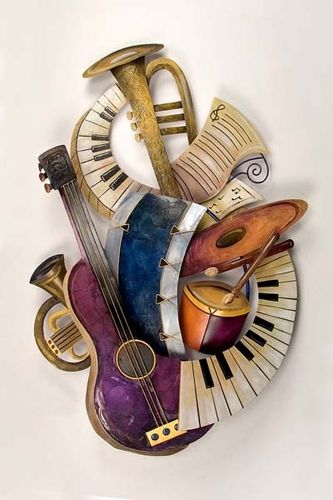







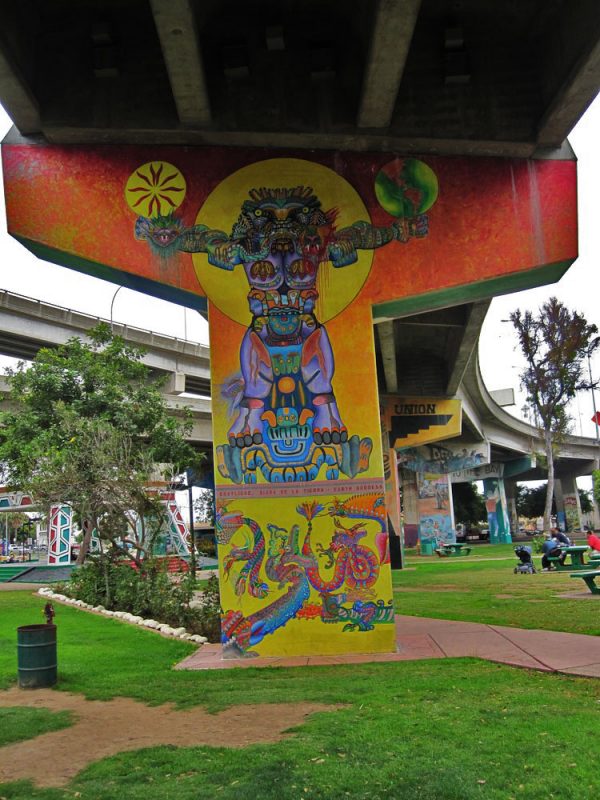



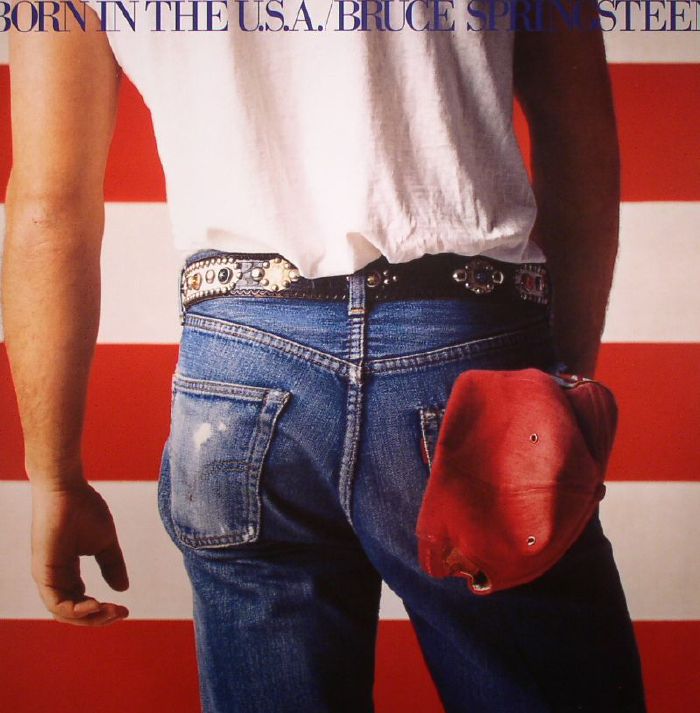

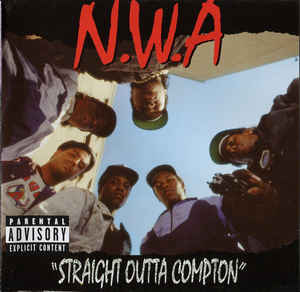

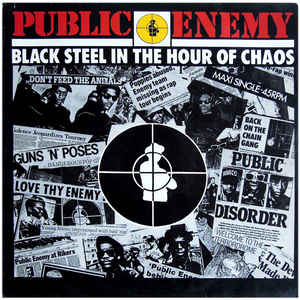
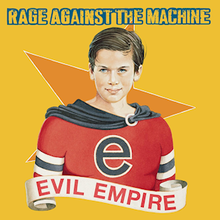

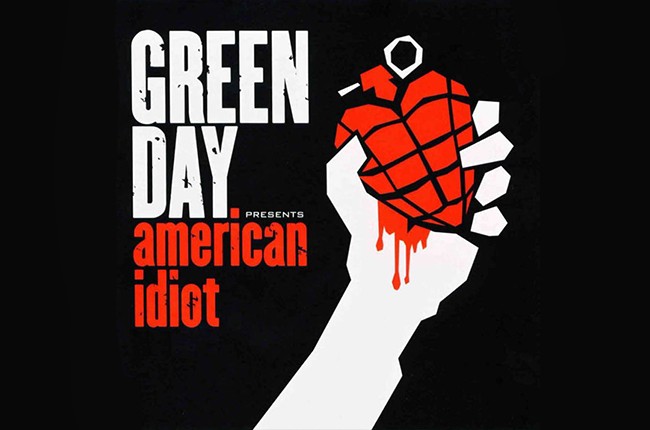

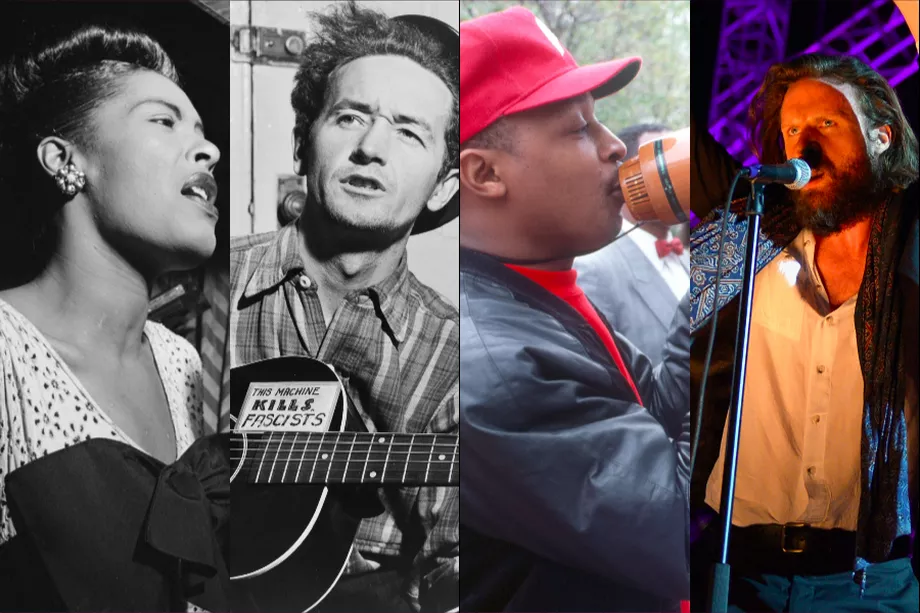



Comments